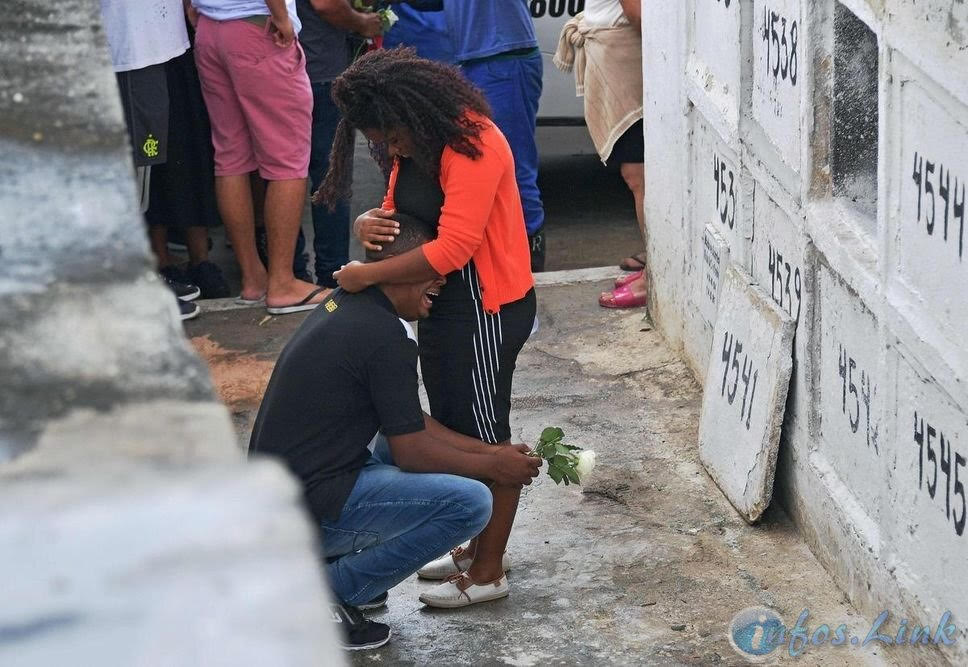
Rio de Janeiro: The photograph shows a smiling eight-year-old girl dressed as Wonder Woman, beaming through gap teeth and crossing her small clenched fists into an X. Shocked Brazilians shared the image of Ágatha Félix online after she was shot in the back in a Rio de Janeiro favela on Friday night by what residents said was a bullet from a police officer’s rifle. She later died in hospital.
She was the fifth young child to be killed in Rio favelas this year. Favela activists, politicians, the public defenders’ office and the president of Rio’s bar association blamed the shoot-to-kill policy of the Rio governor, Wilson Witzel. “He is responsible for the murder,” tweeted Guilherme Boulos, a leftist politician.
An ally of the far-right president, Jair Bolsonaro, Witzel was elected last year after promising a “slaughter” of drug gangsters. On Saturday, as hundreds demonstrated in anger in the Complexo do Alemão favela where Ágatha was shot, the hashtag #aculpaedowitzel (it’s Witzel’s fault) led trending topics in Brazil. Others shared cartoons showing the smiling governor wiping blood from his face.
On Sunday the favela newspaper Voz das Comunidades organised a second demonstration. Led by beeping motorbike taxis, children waved yellow balloons as a small crowd marched behind a banner reading: “Stop killing us.”
The demonstrators walked through the rain chanting “We demand justice for Ágatha” towards a nearby cemetery for her funeral.
“This is the death of a child whose only sin in her life was being poor. Why is the state security policy an extermination policy?” Luciano Bandeira, the president of Rio’s bar association, told O Globo newspaper. “There is no remorse, no admission of fault, no will to rethink the policy to avoid other deaths like this happening.”
Ágatha was travelling with her mother, Vanessa Sales, in one of the vans that serve as public transport in the winding lanes of the sprawling favela when she was shot in the back. Police said they responded to an attack from gang members. Residents said there was no gun battle; a police officer had fired at two men on a motorbike and hit the girl instead.
“Everyone said the shot came from the police, there was no confrontation,” said Thainã de Medeiros, a member of the Complexo do Alemão’s Papo Reto collective, which documents police violence.
“A motorbike passed and he tried to hit it and hit the van. The space was very short, six to seven metres. The shot went through the van, it went through Ágatha’s body,” he said. “This is part of a genocidal policy, of genocide of black people.”
In July, Witzel compared drug gangs that control favelas such as Complexo do Alemão to terrorist groups in an interview with foreign journalists and defended his declaration that it was better to shoot armed gang members in the head. “A bandit with a rifle is a terrorist. How do you treat terrorists? With lethality,” he said.
The governor, who has said he plans to stand for president in 2022, has yet to comment publicly. Instead on Sunday he tweeted congratulations to the Rio town of São Gonçalo on its 129th anniversary. In a statement, his government said it “profoundly regretted” her death, that police came under simultaneous attacks on Friday night in the favela and “responded to the aggression”.
Outside the hospital where Ágatha died on Friday, her distraught grandfather Ailton Félix challenged this version of events in an impassioned speech captured by television cameras.
“Her mother was there and saw there was no confrontation ... They shot at the van and killed my granddaughter. That was it. This is a confrontation? Was my granddaughter armed by any chance to get shot?” he said. “She was studious. She didn’t live on the street.”
Police said they would not change policy, pointing to a 21 per cent fall in homicides across the state from January to August compared with 2018. “We will not back down. The state government is on the right track,” the police spokesman Mauro Fliess told TV Globo.
Pedro Strozenberg, the ombudsman for Rio’s public defenders’ office, said that this came at too high a price. From January to August, 1,249 people in Rio state were killed by police officers – 16 per cent more than the previous year.
Witzel’s policy “kills people involved [in crime] in the community and people who are not involved”, he said. His office also lamented the death of Leonardo dos Santos, a police officer killed last Thursday in nearby Niterói, as evidence that “confrontation has proved inefficient”.
Complexo do Alemão residents at the demonstration on Sunday called onWitzel to end the violence. “When there is a death ... it takes us to our limits, psychologically,” said Camila Santos, 34, who blamed Witzel for “legalising and legitimising” police violence against favela residents.
Later she led a prayer before Marcos Lopes, 34, a motorbike taxi driver, grabbed the microphone and began singing a popular favela rap song. Others joined in. “I just want to be happy, and walk peacefully in the favela where I was born,” they sang.
Adilson Santiago, 54, a drainage worker, watched as the demonstration passed. “The police of Rio de Janeiro have to respect people of favelas like Complexo do Alemão more,” he said. “There are a lot of innocent people inside.”